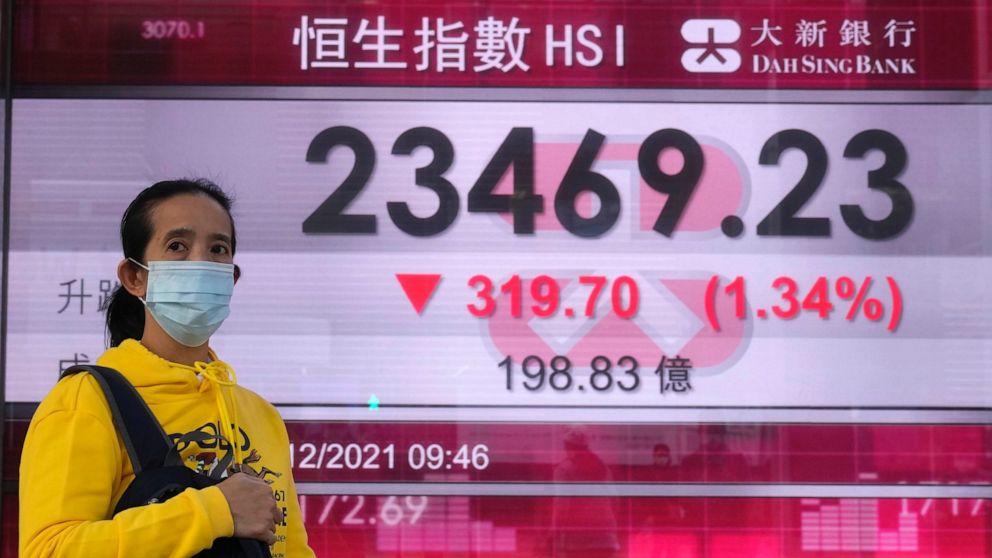Asian shares mostly higher after broad rally on Wall Street
BANGKOK — Stocks were mostly higher in Asia on Friday after a broad rally on Wall Street as investors kept an eye on the spread of the new coronavirus variant and measures governments are taking to restrain it.
Hong Kong slipped more than 1% while Tokyo edged lower. Shanghai and Seoul were higher while Sydney was nearly unchanged.
Chinese ride-hailing service Didi Global Inc. said Friday it will pull out of the New York Stock Exchange and shift its listing to Hong Kong as the ruling Communist Party tightens control over tech industries.
The Securities and Exchange Commission has moved to require that U.S.-listed foreign stocks like Didi disclose their ownership structures and audit reports, which could lead to some of them being delisted.
In another blow for China’s troubled property sector, Hong Kong-traded developer Kaisa Group said it had failed to get the required approvals from bond holders to extend the deadline on payment on $400 million of 6.5% offshore bonds. It had wanted to have the new notes be due on June 6, 2023 at the same interest rate.
The aim was to relieve financial pressure and the plan’s failure to go through raises the risk of a default.
Hong Kong’s Hang Seng lost 0.1% to 23,755.51, while the Nikkei 225 in Tokyo regained lost ground, gaining 1% to 29,029.57. In Seoul, the Kospi climbed 0.8% to 2,968.33. Sydney’s S&P/ASX 200 added 0.2% to 7,241.20. The Shanghai Composite index gained 0.8% to 3,604.05.
In New York, Southeast Asia’s largest ride-hailing company Grab fell 20.5% in its market debut Thursday, following a $40 billion merger in a special purpose acquisition company deal.
The recent rebound may prove to be short-lived, Craig Erlam of Oanda said in a commentary.
“Early signs aren’t promising given the rate of case increases in South Africa and the fact that omicron is already popping up in numerous other countries,” Erlam said. Investors may be “hoping for positive news on the vaccine effectiveness against the new strain and taking advantage of these levels before it’s too late. If they don’t get the news they’re hoping for, we could see another sharp move lower.”
The S&P 500 rose 1.4% on Thursday, its biggest gain since mid-October, to 4,577.10. The Dow gained 1.8% to 34,639.79. The Nasdaq added 0.8% to 15,381.32, held back by a modest drop in Apple, which fell 0.6% after the iPhone maker reportedly warned suppliers that it is seeing weak demand ahead of the holiday season.
The Russell 2000 jumped 2.7% to 2,206.33.
Travel-related companies, which got hammered earlier this week as worries about the new coronavirus variant swept markets, rebounded Thursday. American Airlines climbed 7%, while Delta Air Lines rose 9.3%. Cruise line operators Carnival and Norwegian Cruise Line jumped 9.2% and 7.7%, respectively.
Boeing rose 7.5% after China’s aviation regulator cleared the airplane maker’s 737 Max to return to flying with technical upgrades.
The market rebound comes as investors try to gauge the amount of damage the omicron variant of COVID-19 might inflict on the economy, and measures the U.S. and other governments are taking to restrain it. Trading has been choppy all week and, despite the latest gains, every major index is on track for a weekly loss.
Countries have been imposing barriers to travel and stricter restrictions on businesses and people. Concerns about global restrictions potentially crimping economic growth joined worries over rising inflation, which has prompted the Federal Reserve to consider withdrawing stimulus measures sooner than expected.
The yield on the 10-year Treasury was steady at 1.44%.
U.S. crude oil prices rose after OPEC and allied oil-producing countries decided Thursday to stick to their plans to boost output via steady, modest monthly increases in oil releases, even as the omicron variant adds more uncertainty over the global economic recovery from the pandemic. Energy companies gained ground. Chevron rose 2.7%.
Early Friday, U.S. benchmark crude oil had gained $1.27 cents to $67.77 per barrel in electronic trading on the New York Mercantile Exchange. Brent crude, the standard for pricing international oils, gained $1.20 cents to $70.87 per barrel.
The U.S. dollar rose to 113.34 Japanese yen from 113.06 yen late Thursday. The euro slipped to $1.1284 from $1.1300.
![]()


